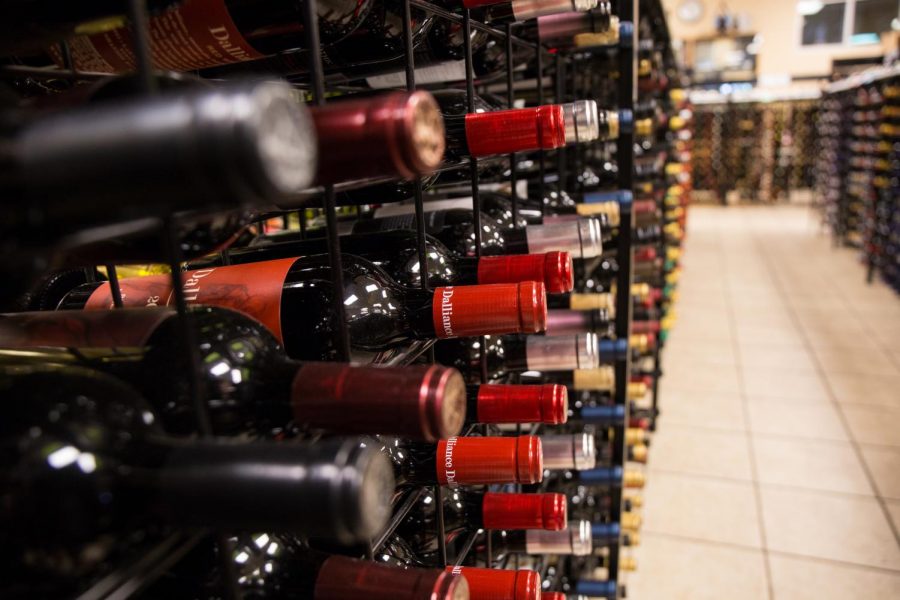Mendenhall: LDS Church Influences State Liquor Laws Once Again
The Utah State liquor store on July 11, 2018. (Photo by Justin Prather | Daily Utah Chronicle)
June 20, 2022
Several changes were made to the Department of Alcoholic Beverage Control during Utah’s last legislative session. The most recent change in liquor laws occurred on June 1 of this year. These included a name change of the DABC (now Department of Alcoholic Beverage Services) as well as laws pertaining to alcohol to go and how to identify certain drinks. And now grocery stores cannot sell many hard seltzer brands, as most hard seltzers’ ABV lay right around the 5% mark – Utah’s maximum limit.
Since Utah is a predominantly Mormon state, our laws regarding alcohol tend to be stricter than those of surrounding states, a failure to separate church and state in deciding liquor laws.
Utah is an alcoholic beverage control state, meaning the state has complete authority over selling beverages like wine, beer and cocktails. And while we don’t see tons of direct lobbying from the Church of Jesus Christ of Latter-day Saints, 86% of Utah lawmakers are Mormon.
Former Sen. Jim Dabakis once reported to the Salt Lake Tribune that a House leader refused to vote against the church which was in favor of a bill that, if passed, would lower the legal blood alcohol level, even though the House leader was “not thrilled about it.” Failing to vote separately from one’s religious beliefs clearly violates separation of church and state, where the government is required to stay neutral no matter its religious affiliation. As a resident of Utah, I see the influence that the LDS church has on communities throughout the state. And their influence on changes to our liquor laws is no different.
I reached out to liquor lawyer Tanner S. Lenart to help provide additional clarity surrounding Utah’s constantly changing liquor laws. According to her profile on Christensen & Jensen Attorneys, she “focuses her practice on regulatory matters before state and local governments, including the Department of Alcoholic Beverage Control and city councils.”
When I asked Lenart about her feelings towards this issue, she shared a few thoughts with me. She first explained that “It would be disingenuous to think that the dominant religion in the state, which does not approve of alcohol consumption, doesn’t affect the liquor laws.” She followed up with, “I do get very frustrated when I feel like they vote as a block. You know, as opposed to thinking about it.” With Lenart raising a valid point, I have felt that residing in a state with such a dominant religion has made it nearly impossible to elect lawmakers who have views separate from the LDS church.
I also asked Lenart how Utah’s implementation of nine new bar licenses will better serve our local businesses. She said, “There wasn’t an industry push to have more licenses available. But technically, all that happened was they said, okay, we’re gonna give out more resort licenses. And you guys, you guys who are all resorts, when you switch over to getting this new resort license … all of their bar licenses are coming back into the pool. Really kind of a sneaky way.”
Essentially, the legislature’s changes don’t make much of a positive impact on businesses seeking bar licenses. To properly educate ourselves on all policies and regulations surrounding alcohol, our government should do a better job of advocating for the public and listening to our needs. We can’t understand or follow such regulations if our laws are confusing and hard to understand.
Our lawmakers’ religious stances influence decisions that must remain secular. These lawmakers are people that we look to in providing comprehension and rules surrounding laws. We cannot fully respect their authority if they allow religious views to cloud their judgment. If we don’t call out our authority figures now, they will continue to toe the line in the future and push the boundaries of a non-secular state government.









S M • Jun 20, 2022 at 3:01 pm
“Mormons”, really? We are members of The Church Of Jesus Christ Of Latter Day Saints. A respectful, professional journalist uses correct titles.
John Hedberg • Jun 20, 2022 at 9:50 am
What about political ideologies, which many people follow as fervently and thoughtlessly as religious ones? I come from Deep Blue Massachusetts, where I’ve actually been denied jobs I was best qualified for because of my surface demographics: since I don’t (apparently) fit into any of Democrats’ favorite oppressed groups (I do, but their hatred has no ears), I’ve been wait-listed behind others I later outperformed, I’ve been denied promotions even though my good performance was being used as a training tool for new recruits, and I was even let go from a temp position where I showed up during a Nor-Easter blizzard to work when nobody else did, where my production levels were good, and they needed the help, simply because the HR Leftist didn’t like the surface of “what” she saw (not “who” she saw: she’d already dehumanized me, and it showed!😂).
When someone believes in an ideology to the point where it denies other people their basic humanity as equal brothers and sisters, children of the same Infinite Love (by whatever name)… in all our fallibility, our immense potential, and our beautiful diversity as individuals of great worth, as family, which is the high standard we should be aiming for in our behavior towards one another… when someone believes in an ideology to the point where it denies other people’s humanity and dehumanizes them as individuals as precious as you and I and all those we love, it doesn’t really matter whether that dehumanizing ideology is a secular or a religious one: the effect of their bigotry is the same.
So I’ve observed, from up close.
If you have a specific law you’d like to change, draft a bill. Share it! There may be enough other people who agree with you that we can go get it passed.
If you’ve got nothing to share except “Oh, there’s nothing we can do, because this whole group of (add name here) are unfair and oppressive”, you’ve just stopped yourself from doing anything that might advance your cause by talking yourself out of action. I’m not LDS, but I know Mormons who drink, like tobacco, and smoke pot. Some of them even like sex, if you can believe that’s possible! 🙂 They’re as diverse individually as any group, since there’s no such thing as a homogenous group of people: everyone is unique in their perspective, experience, talents, gifts, errors, and how they grow from them. Therefore, anyone can be appealed to through logic and compassion, if you work hard at it! And everyone is worth that effort. That’s almost the definition of genuine Love.
Have A Great One! I still don’t know what it is specifically that you wanted to advocate. Lower blood alcohol levels? Higher alcohol percentage limits? It wasn’t clear, but if it’s a good idea, share it! If enough of us see your vision, you can change society. We can even call it the Adds Mendenhall Attenuated Liquor Law, and we’ll share a toast to you!
All the Best,
J Hedberg